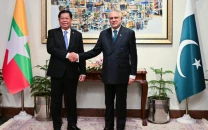Liberating languages
It’s when you make language an issue that it actually becomes an issue

Y was baffled. He didn’t understand X’s language.
He said to X: “Chitoray ta’o?”
Insuperable linguistic barriers existed between X and Y.
Z came along the way and mumbled: “Mann vashaan. Chitoray ta’o?”
Questions over brotherhood and affinity immediately arose for all three. X was convinced that those who he can communicate with in the same language are of the same ‘ilk’ as he is. And those whose languages he doesn’t understand are different from him, even if unbeknownst to him, his ideas are close to theirs.
Languages are supposed to facilitate communication. However, don’t they in some cases, end up thwarting it instead of enabling it?
Let’s not forget how Urdu attained its stature as a language of the Muslims. Some prominent Hindus founded a movement whose main objective was to replace Urdu with Hindi, as the official court language and as the language of instruction in India. And right there, you have the makings of the Urdu-Hindi conflict.
It’s when you make language an issue that it actually becomes an issue. Urdu is a heterogeneous language, which evolved out of the melding of the different cultures of South Asia. The resistance to Urdu was seen as a threat to the Muslim identity and made Muslims cling on to it even more than they originally did. I fear that with the imposition of Urdu as the official language in modern-day Pakistan in a bid to ‘emancipate’ ourselves from English, we will end up ignoring Sindhi, Balochi, Pashto and Punjabi. This is indeed a paradox. Escape one language and you get trapped in the shackles of another, and you keep trying to hold on to one language or the other to retain your ‘identity’.
Heard of multilingualism? Of course you have. Ever thought of actually endorsing this concept officially? I don’t think so.
Let languages flourish on their own without official interference. However, don’t ‘orphan’ some and ‘mother’ the others. Remember the language controversy surrounding Bengali in the early years of Pakistan? We shouldn’t be going down that road again, and all our languages, including Sindhi, Punjabi, Balochi and Pashto, need to be promoted.
The dilemma we face can be encapsulated in the contrasts represented by this piece — written in English, focusing on the imposition of Urdu, and talking about the need to promote all our languages. I’ve been unable to stay away from the coloniser’s language, even while talking about my ‘national language’.
Published in The Express Tribune, October 12th, 2015.



















COMMENTS
Comments are moderated and generally will be posted if they are on-topic and not abusive.
For more information, please see our Comments FAQ